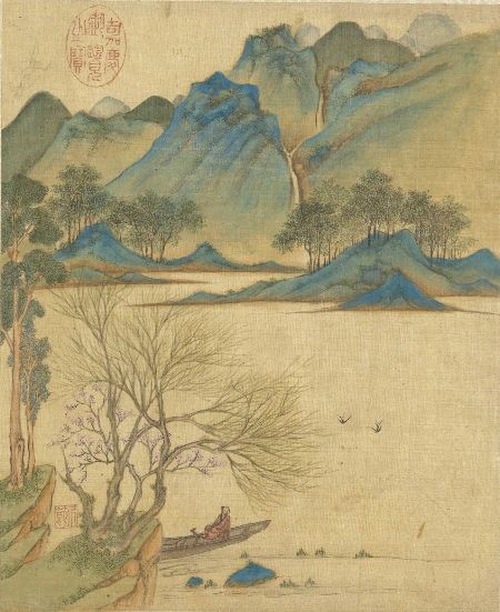(Minghui.org) In the Chinese calendar, the four seasons are further divided into 24 solar segments. Yushui (Rain Water) comes after lichun (Beginning of Spring), and this year it began on February 19.
Wu Cheng, a scholar in the Yuan Dynasty, said spring is associated with wood, as in the wood of the Five Elements, and that it represents the growth of crops. Because wood comes from trees that need water to grow, water from thawing ice and snow is needed in early spring.
From another perspective, Rain Water is also the time when yang rises while yin declines. The rising temperatures and rainwater will ensure that crops do well in the coming year.
The Beginning of the Year
As the first season of the year in the Chinese calendar, spring spans three months from lichun (usually February 4 or 5) to lixia (Beginning of Summer, usually May 5 or 6). As it says in The Gongyang Zhuan (a commentary on the Spring and Autumn Annals), “What is spring? It is the beginning of the year.” Because the Big Dipper points to the east in spring, people in ancient times also said east represented spring.
Spring is also the most promising season of the year. The arrival of rain means the freezing snowy days are gone, and we welcome the warm days and balmy breezes in anticipation of a good harvest.
Du Fu, a renowned poet in Tang Dynasty, once wrote,
“A good rain comes at the right time, during spring when plants are ready to climb;It arrived with wind at night,nurturing the crops quietly for a harvest.”
Spring is a season of planting, a season of cultivating, and a season of hope. Yan Zhitui, a scholar during the Northern and Southern dynasties, wrote in Yanshi Jiaxun (Family Instructions of Master Yan), “Studying is similar to planting a tree, as we enjoy its flowers in the spring and collect its fruits in the autumn. When we read articles, we appreciate them like blossoms in the spring; when we apply them in our daily life, we put what we gained into action like harvesting our crops in the autumn.”
Needless to say, days of rain are critical for farming. There is a saying “The sugarcane grows quickly node by node in the rain.” Plants grow quickly during this period of time.
Maintaining Our Health
Taking care of our body is also important around the time of Rain Water. That is especially so when it comes to the spleen and stomach. According to Chinese medicine, these two organs are the source of qi and blood. If the spleen and stomach are functioning well, so will the body; if not, one’s health will decline.
Huangdi Neijing (The Canon of the Yellow Emperor) proposed: “One should nourish yang during spring and summer and yin during autumn and winter.” Sun Simiao, a renowned physician of the Tang Dynasty explained, “In spring one should eat fewer sour things and more things that are sweet to nourish the spleen.”
Although yang rises in the spring, it takes time due to all the yin that has accumulated during the long winter. When one’s physical functions do not keep up with the changes in the weather, one may catch a cold or flu. That is why the elderly in China often urged to wear a little extra to keep warm in the spring, just in case.
 A painting of a spring scene by Ju Jie in the Ming Dynasty (public domain)
A painting of a spring scene by Ju Jie in the Ming Dynasty (public domain)
Planning for the Season
Emperors in ancient times always followed the divine to guide their people. This included planning for farming in the first month of spring. For example, officials surveyed the conditions of the hilly lands to decide what to plant. The emperors themselves might also farm to lead by example. Furthermore, the emperors ceremoniously worship and thank the divine at the beginning of the year on behalf of all their people.
Preserving and protecting the harmony of heaven, earth, and mankind was well-established in ancient China. Since it was a season of growing, emperors often issued edicts to ban certain activities in the first month of spring, such as killing female birds and female animals in general, cutting down trees, destroying birds’ nests, and large-scale construction. Furthermore, bones or bodies abandoned in the wilderness had to be buried.
Nurturing the Mind
As discussed above, rainwater in the spring is very precious. Together with wind, it is critical for the crops.
Just like plants, our minds also need nourishment. Staying away from negative feelings such as hatred and listening to one’s conscience will go a long way to this end. In fact, this is what tens of millions of Falun Dafa practitioners have been doing by following the principles of Truthfulness-Compassion-Forbearance. After all, only by seeding kindness and putting in real effort to cultivate those seeds will one end up with a good harvest.
Copyright © 2024 Minghui.org. All rights reserved.
Category: Traditional Culture









